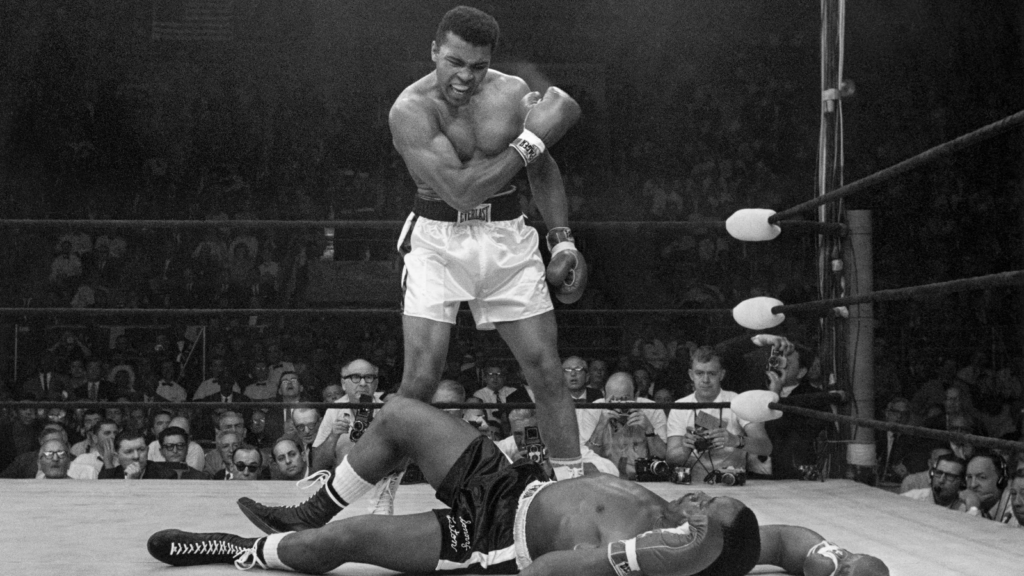You’ve probably heard the Adidas slogan Impossible is Nothing, a phrase originally coined by the legendary Muhammad Ali. It’s a mighty powerful phrase that inspires us to dream big and never give up, a killer jab to end the debate of hard work vs talent forever.

Ali believed hard work could overcome any obstacle. It worked for him.
I, however, disagree.
Humans have natural differences that play a crucial role in any competitive environment.
Some people are smarter, some are faster, some are stronger.
Some are creative, chaotic, and artistic; others are methodical, orderly, and logical.
The question of hard work vs talent is fundamentally flawed. Both are really useful, and both have limitations.
Hard work will improve your strengths and greatly reduce your weaknesses, but when the bar is set sufficiently high, no amount of hard work will compensate for a lack of talent.
To put it bluntly: There are things you can never achieve, no matter how hard you try.
If reading that made you cry, here, have some tissue. And don’t worry—differences in talent aren’t all that bad.
In fact, if you stop lamenting you don’t have Jamaican sprinter genes and start choosing goals that are well aligned with your talents, you will gain a competitive advantage and improve your chances of success drastically.
I’m going to teach you exactly how to do that.
Let’s start by clearly defining what talent is.
What is Talent, Exactly?
Talent is made up of two different components:
- The first component is people’s mental or physical innate ability for a specific task. Take 100 kids of the same age who never played basketball and test their skills. A select few will perform remarkably well, most will be average, and a couple will shoot the ball backward hitting their face, trip over, fall on their heads, and end up with severe and irreversible brain injuries. In this case, talent is what sets each group apart from the rest.
- The second component of talent is the rate at which a person is able to learn something new or improve their skills. If person A learns in one week what takes a month for person B, the talent gap is obvious, and the difference between their results will compound as time passes.
How Talent Became a Cursed Word
The idea of talent as an inborn gift must have been basic common sense in most societies throughout history, but in the modern Western world, it has become a controversial concept.
In a society that glorifies equality, the idea that individuals differ in their innate levels of ability is often considered evil.
The main reason behind this negative view is that we have a hard time coming to terms with the existence of unearned biological advantages.
Does God have favorites?
Top performers usually receive the most respect, love, and appreciation within a group. Therefore, attributing (to some extent) their higher status to an innate, unearned advantage like talent feels unfair.
Accepting that you lost a competition because your rival was born with more suitable qualities can be very hard, especially after investing a lot of time and effort in competing with him.
We hate to accept that we might not be capable of reaching the level our brother, friend, or co-worker is at. But this only reveals a species-wide insecurity we must learn to work through.
Becoming a talent denier just to feel better about ourselves is not a good life strategy.
Talent denial is wishful thinking
Yet, in the hard work vs talent debate, the role of talent gets constantly downplayed.
Documentaries rarely talk about it.
Instead, they tell epic stories about the iron mindset of sports superstars and their rock-solid discipline so that people can identify with those qualities and aspire to develop them, sustaining the illusion that they, too, could be like Michael Jordan if they worked hard enough.
“He got cut from the high school basketball team and became the GOAT thanks to his mindset, bro.” “He spent hours practicing by himself.”
Listen, bro. If you really think the basketball GOAT didn’t have an insane amount of talent, you’re delusional.
And don’t get me wrong. He would have never become the GOAT if he didn’t have a flawless work ethic and a legendary competitive drive. I agree.
There are countless cases of gifted athletes who destroy their careers because of poor choices and an anticompetitive lifestyle.
The point I’m making is that ignoring the role talent plays in success is a recipe for wrong decisions, for which you will eventually pay.
Talent doesn’t sell sneakers
There’s another reason why talent is an unpopular concept: it’s simply not business-friendly.
There’s a lot of money to be made in selling training routines, supplements, and “life hacks”. But no product can give you the fast-twitch muscle fibers of a 100m Olympic athlete or the brain of Einstein.
A business has a lot to gain by convincing you that its product will finally bridge the gap between mediocrity and greatness.
Nihilists, get the fuck off my blog
On the opposite side are those who use talent and genetics as an excuse to never get off the couch and start competing. This is even more stupid than talent denial since it leads straight down the path of inaction and decay.
Again, the question of hard work vs talent is not an either-or proposition. In almost every case, both are absolutely necessary.
Your best choice is to accept the role talent plays in life and make the best use of it.
Turn your talent into an asset
We’ve already established that talent is a real thing and ignoring it is not a good life strategy.
But what can we do with that information? How can we use our talent as an asset instead of a demoralizing argument or an excuse for failure?
The solution lies in identifying your strengths and capitalizing on them.
In competitive environments, play games in which your strengths take the spotlight and your weaknesses are as irrelevant as possible.
If Michael Jordan had studied astrophysics and Neil deGrasse Tyson would have gone for a career in the NBA, I highly doubt you would know their names.
The school system, the job market, sports, and the sexual marketplace all have a competitive element that shouldn’t be ignored. If we were all fully aware of our strengths and weaknesses and played the game accordingly, every single player would benefit.
Let’s take the dating market as an example.
There’s more than one way to bust a nut
John is 6’4”, has a six-pack, and his arms look like Schwarzenegger’s. He has an average job, and his social circle is limited to the friends he made in high school.
Mike, however, is 5’6” and has an average physique. He is an ultra-successful business owner with massive charisma and an extensive social circle consisting of really interesting people from all walks of life. He loves to travel and has been to 50 different countries.
Obviously, John will be very successful hitting on gym chicks and posting shirtless pictures on Tinder.
Meanwhile, Mike will do very well by leveraging his status and social skills and showcasing his exciting lifestyle.
It makes no sense for John to rely on his lifestyle and status to attract women, or for Mike to take shirtless pictures and post them on Tinder.
This example illustrates very clearly how the hard work vs talent debate misses the mark. Both John and Mike will get the most results in life by working hard on the things they’re naturally good at.
The same applies to you and me and every person who ever existed.
If you want to make good life choices, you must be very aware of your strengths and put yourself in the best possible environment to capitalize on them.
How to identify your talents
A problem you might encounter is not knowing what you’re gifted for. Talent can be hard to measure when you aren’t either extremely good or horribly bad.
Some people say talent is fully revealed only after you’ve gone through thousands of hours of practice, and I can understand their view. However, by then the time and energy investment are huge, and the opportunity cost is almost never worth it.
You don’t need to wait years to know if you have what it takes or not. Life should give you clues from very early on.
These are 7 strategies that may help you identify your natural strengths.
1. Take compliments seriously
Most people don’t go around giving compliments just because. Sometimes they will notice traits and abilities that you take for granted but are actually more exceptional than you think.
2. Pay special attention to patterns
If your girlfriend says you have a good dick, perhaps she’s just being nice. If it’s ten different girls, rest assured your dick is world-class.
3. Compare yourself to people of similar experience and background
If you consistently outperform others without working harder than them, you probably have an edge on that activity. If you only manage to get average results even after working hard, you probably don’t.
4. Professional feedback is gold
Seek brutally honest professional feedback. A genuine compliment from someone who actually knows what he’s talking about is a great sign.
5. Analyze your past victories
Which traits or skills lead to your past successes? Considering the hard work vs talent question, where those skills developed through practice, or did they come naturally?
6. Analyze your past defeats
Taking note of the reasons things didn’t go according to plan is the hardest thing of all. It requires exceptional self honesty and personal accountability, but it can spare you a lot of time and future disappointment. I’m not saying you should give up easily, but if reality doesn’t match your expectations through months or years, those expectations are obviously not grounded in reality.
7. Dare to explore new things
If there’s something you often think of doing, try it. Your intuition might be leading you somewhere you actually belong.
Sometimes Ignoring Talent Is The Right Choice
Despite everything I’ve said, there are times when it’s best to completely forget talent exists.
Once you get busy with anything, you must focus on what is under your control. You can’t change your natural ability, so worrying about it is wasted energy.
If you want to improve your grades, you should probably study instead of wishing your IQ was 30 points higher.
If you want to improve at basketball, you should focus on developing your game instead of wishing you were taller.
In Any Case, Know Yourself
However, you should definitely consider talent when deciding which goals you should pursue. For instance, choosing a career in a field you seem to be somewhat gifted in should make your life easier—particularly if there is a market for it.
Hard work, dedication, persistence, and resilience are different factors that contribute to success, and so is talent. The more factors you stack, the greater your chance of getting what you want.
Therefore, the question of hard work vs talent is best resolved this way: play to your strengths, and then work hard.
It’s both, it’s always been both, and it will always be.
Play to your strengths, and life will reward you for it.

Leave a Reply